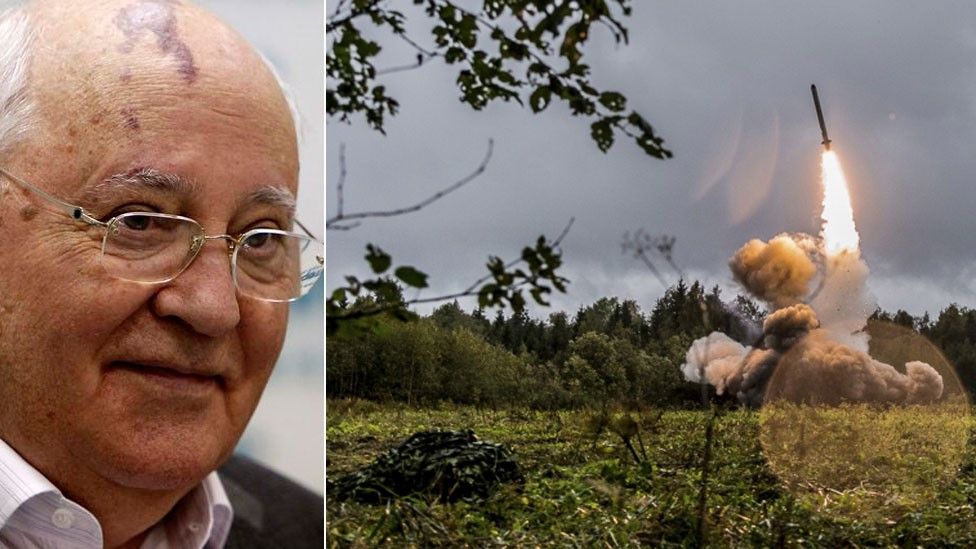Russia nuclear treaty: Gorbachev warns Trump plan will undermine disarmament
- Published

Former Soviet President Mikhail Gorbachev says US President Trump's plan to withdraw from a key Cold War nuclear weapons treaty is a reversal of efforts to achieve nuclear disarmament.
Mr Gorbachev - who signed the Intermediate-Range Nuclear Forces (INF) treaty with President Reagan in 1987 - questioned the plan's intelligence.
Mr Trump said Russia had been "violating [the INF] for many years".
Russia has condemned the plans and threatened to retaliate.
The Kremlin said President Vladimir Putin would be seeking an explanation from visiting US National Security Adviser John Bolton.
Germany was the first US ally to criticise the move, with Foreign Minister Heiko Maas urging Washington to consider the consequences both for Europe and for future disarmament efforts.
The INF banned ground-launched medium-range missiles, with a range of between 500 and 5,500km (310-3,400 miles).
It was signed near the end of the Cold War, a period of relations between the US and the Soviet Union from 1945 to 1989 marked by intense international tension and overshadowed by the threat of nuclear conflict.
In the past five decades the US and Russia have signed a range of joint agreements to limit and reduce their substantial nuclear arsenals.
Who is Mikhail Gorbachev?
- The last General Secretary of the Soviet Union
- Appointed in 1985, his domestic reforms and nuclear disarmament deals helped end the Cold War
- Resigned as Soviet president in 1991 after Soviet republics declared independence
Read more: The man who lost an empire
What exactly has Trump said?
President Trump said the US would not let Russia "go out and do weapons [while] we're not allowed to".
"I don't know why President [Barack] Obama didn't negotiate or pull out," the president said of the INF treaty after a campaign rally in Nevada.
In 2014, President Obama accused Russia of breaching the INF after it allegedly tested a ground-launched cruise missile. He reportedly chose not to withdraw from the treaty under pressure from European leaders, who said such a move could restart an arms race.
How has Russia responded?
"This would be a very dangerous step that, I'm sure, not only will not be comprehended by the international community but will provoke serious condemnation," Russia's Deputy Foreign Minister Sergei Ryabkov said.
The treaty is "significant for international security and security in the sphere of nuclear arms, for the maintenance of strategic stability," he told state news agency Tass.
The minister also told the news agency RIA Novosti that if the US continued to behave "clumsily and crudely" and backed out of international agreements, "then we will have no choice but to undertake retaliatory measures, including involving military technology".
"But we would not want to get to this stage," he added.
'A significant setback'
Analysis by BBC defence and diplomatic correspondent Jonathan Marcus
Concern about Russia's development and deployment of a missile system that breaches the INF treaty predates the Trump administration. But the president's decision to walk away from the agreement marks a significant setback for arms control.
Many experts believe that negotiations should have continued to try to bring the Russians back into compliance. It is, they fear, part of the wider unravelling of the whole system of arms control treaties that helped to curb strategic competition during the Cold War.
Other factors too may have played into President Trump's decision. This was a bilateral treaty between Washington and Moscow. China was free to develop and deploy intermediate range nuclear missiles. Some in the Trump administration feel that the INF treaty places them at a growing disadvantage in their developing strategic rivalry with Beijing .
Has Russia breached the treaty?
The US insists the Russians have, in breach of the deal, developed a new medium-range missile called the Novator 9M729 - known to Nato as the SSC-8.
It would enable Russia to launch a nuclear strike at Nato countries at very short notice.
Russia has said little about its new missile other than to deny that it is in breach of the agreement. Analysts say Russia sees such weapons as a cheaper alternative to conventional forces.
The New York Times reported on Friday the US was considering withdrawing from the treaty in a bid to counter China's expanding military presence in the western Pacific. China was not a signatory of the deal, allowing it to develop medium-range missiles without restraint.
The last time the US withdrew from a major arms treaty was in 2002, when President George W Bush pulled the US out of the Anti-Ballistic Missile Treaty, which banned weapons designed to counter ballistic nuclear missiles.
His administration's move to set up a missile shield in Europe alarmed the Kremlin, and was scrapped by the Obama administration in 2009. It was replaced by a modified defence system in 2016.
What is the Intermediate-Range Nuclear Forces (INF) treaty?
- Signed by the US and the USSR in 1987, the arms control deal banned all nuclear and non-nuclear missiles with short and medium ranges, except sea-launched weapons
- The US had been concerned by the Soviet deployment of the SS-20 missile system and responded by placing Pershing and Cruise missiles in Europe - sparking widespread protests
- By 1991, nearly 2,700 missiles had been destroyed. Both countries were allowed to inspect the others installations
- In 2007, Russian president Vladimir Putin declared the treaty no longer served Russia's interests. The move came after the US withdrew from the Anti-Ballistic Missile Treaty in 2002
- Published15 February 2017
- Published18 January 2017
- Published29 July 2014